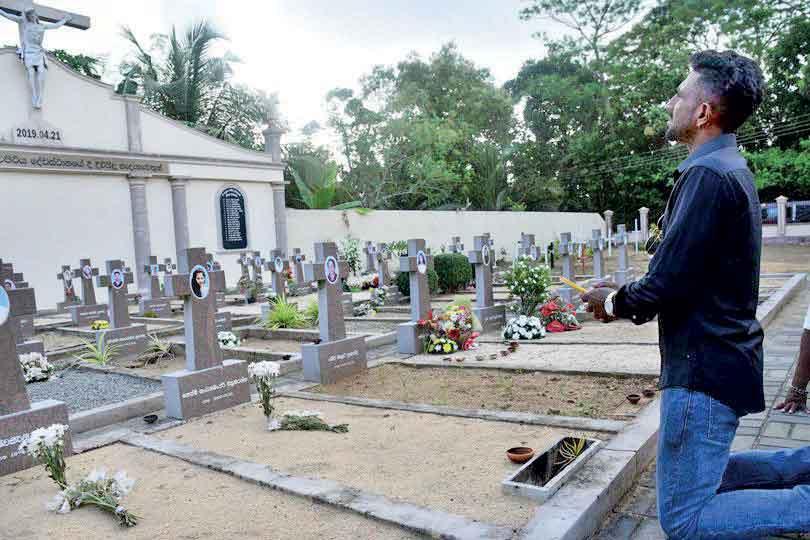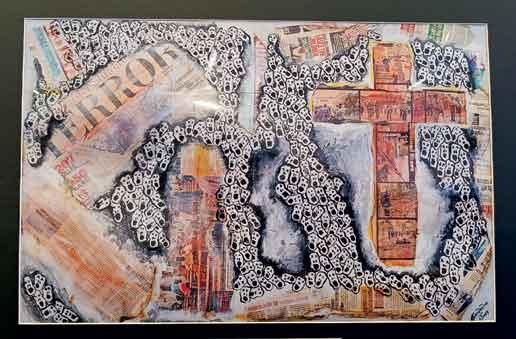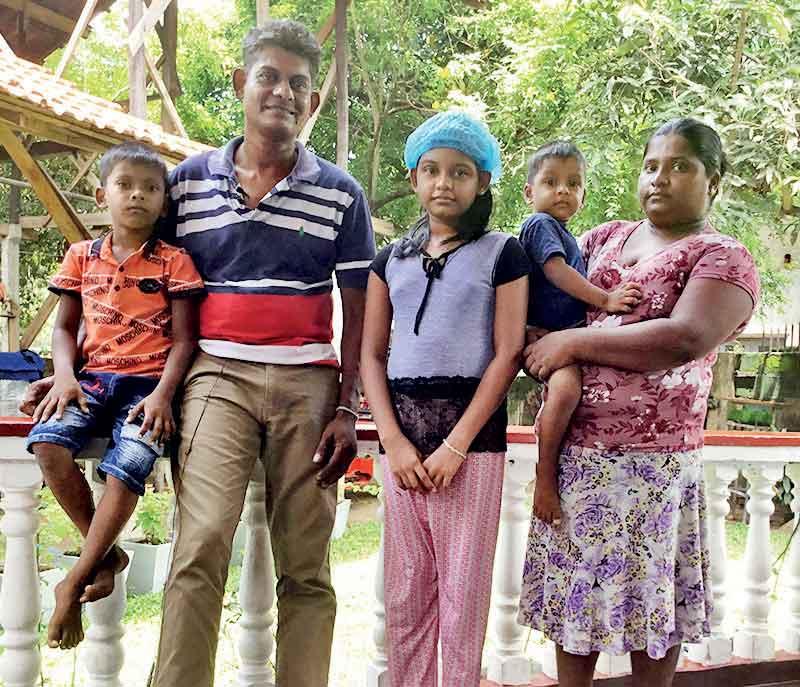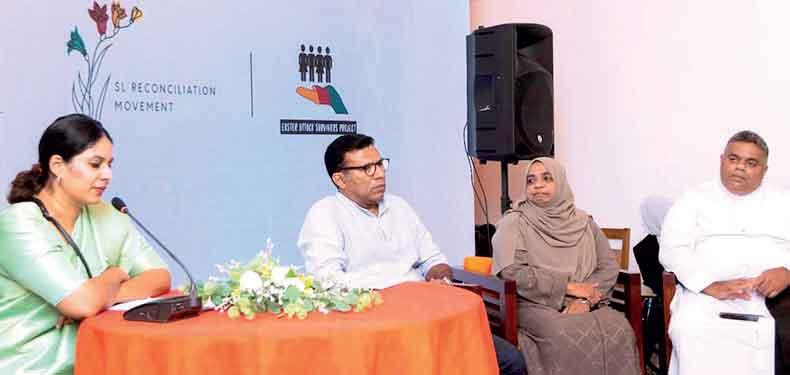25 Oct 2024 - {{hitsCtrl.values.hits}}

Five years later, families and survivors of the Easter Sunday attack still await justice
Pic by Pradeep Pathirana
|
The survivors and families of victims have faced numerous challenges in trying to cope and adjust to the aftermath of the attacks Some were permanently disabled while others continue to experience the psychological trauma In Katuwapitiya there were 78 funeral houses with 116 bodies in just one village |
|
An artwork at In Their Memory exhibition symbolising healing for those affected by the attacks
|
Five years after the Easter Sunday carnage claimed the lives of over 250 individuals, Sri Lankan authorities are still struggling to find the mastermind behind these deadly attacks. Families and survivors of the attacks have continued to live with trauma and unhealed wounds while demanding justice for those who have parted since April 21, 2019. After various commissions and reports, another controversy arose when Pivithuru Hela Urumaya Leader Udaya Gammanpila demanded the immediate removal of Senior Deputy Inspector General of Police (DIG) Ravi Seneviratne from his position as Public Security Ministry Secretary based on certain findings on two unpublished committee reports commissioned by former President Ranil Wickremesinghe in 2023 and 2024. But for families of victims, justice seems to be a fading dream.
“Main suspects still at
large” – Arasaratnam
Rebecca Arasaratnam is one victim who suffered third-degree burns during the attack on Zion Church, Batticaloa. She lost her sister, brother-in-law and nephew. In 2022, she tied the knot with Sridharan Kaushikan and responding to query on the slow progress of investigations during previous interview with the Daily Mirror, she said that she has placed her trust in God and that according to her faith they have been taught to love and forgive. Today, Rebecca is back in hospital as her doctors have diagnosed a brain tumor. She has only 20% vision in her left eye and she has been advised to undergo surgery.
“We have to collect a sum of Rs. 2.8 million in three weeks and so far our friends and relatives have supported in collecting around Rs. 1.5 million,” Kaushikan told the Daily Mirror. Speaking about the recent controversies regarding the commission reports, Rebecca’s father Verl Arasaratnam said that the main suspects who need to be interrogated are still at large. “We didn’t have any hopes during the previous governments, but we have some hope on the incumbent government. Some of the main suspects are individuals who have held ministerial portfolios during previous regimes, so we hope that they are questioned and punished,” he added.
“We didn’t even receive proper compensation” – Milroy
Sneha Mindani survived the deadly attack on St. Sebastian’s Church, Katuwapitiya. She was lying unconscious when a neighbour spotted her beneath the rubble and had quickly informed her parents. Sneha had been a very active student in school, engaging in various extracurricular activities. But following the attack, Sneha underwent multiple brain surgeries. Today she complains of a headache and feeling of nausea whenever she is outdoors. “She can’t exert herself too much and all her plans faded after she got injured from the attack,” said Senarath Milroy, Sneha’s father.

An artwork reflecting the profound suffering endured by the victims of the attacks.
When asked about the recent allegations revealed by former MPUdaya Gammanpila, Senarath said that all these seems to be politically motivated agendas. “We didn’t even receive the second installment of compensation that was promised to us. We only received the initial payment and that was it. So there doesn’t seem to be a uniformity in any of these promises. On the other hand it seems like they are trying to safeguard one another without going after the actual masterminds behind this attack. When Gotabaya Rajapaksa assumed power he said he would apprehend perpetrators in two weeks. But that remained a false promise. I lost seven members of my family and justice hasn’t been served to any of the victims,” Milroy further said.

Senarath Milroy (second from left) and Sneha (middle) with family
In Their Memory: Stories from the aftermath
The survivors and families of victims have faced numerous challenges in trying to cope and adjust to the aftermath of the attacks. Some were permanently disabled while others continue to experience the psychological trauma. In this backdrop the Sri Lanka Reconciliation Movement initiated the Easter Attack Survivors Project for the purpose of enabling discourse on peace and reconciliation through story telling.
In Their Memory: Honouring victims and survivors of the Easter Sunday attacks organised by SLRM, InterNews and the Easter Attack Survivors Project explored lively and meaningful means of storytelling to reflect, remember and honour survivors of the Easter Sunday attack. With a vision to establish a permanent memorial for Easter Sunday attack victims across Sri Lanka, this event explored the role of art and storytelling as tools of healing in the aftermath of such devastation.
Assisting victims to deal with trauma and loss
Describing his role in Katuwapitiya after the Easter attacks particularly supporting the communities and families of victims, Fr. Prasad Harshan said that they never dreamt of a disaster of this nature. “Therefore none of the people in the community were prepared. When I heard of the news I was in Thalawila with my family. We were celebrating Easter Sunday celebrations. When a person is wounded not only is he wounded physically but psychologically as well. So initially we had a meeting with the priests and we organised three major teams; one team of priests and nuns looked after those who were physically wounded and the other team looked at healing their souls with counseling sessions. The other group of priests was appointed to heal them spiritually. These attacks weren’t a mere attack on churches, but also targeted at people in hotels who were celebrating Easter Sunday. So at the beginning we had these three teams helping people physically, psychologically and spiritually. This is how we started this mission.”
He further said that they had only one solution to begin with and that was to silently be with the victims. “Everybody only had one question; where is God? And why did it happen to them on this day? These were terrible questions and we had no answers. We could only help them by listening to them for hours. To be honest we also had to learn by working with them because we never faced such a disaster before. Eventually we were able to professionally help them and we are still with them,” he added.
The victims from Kochchikade were from various parts of the country such as Jaffna, Mannar and Kandy. “In Katuwapitiya there were 78 funeral houses with 116 bodies in just one village. So the entire village was like a funeral house. The next morning His Eminence visited the mosque, met with Muslim leaders and had a long chat, embracing one another. Then only people realised that there was a hidden plot. Our leaders were ready to work together and we were able to crush the ugly head of the Evil One. We were able to educate our people not only by words but also by actions,” he added.
Impact of detentions in Kathankudy
Aneesa Firthouse, a women’s rights activist from Kathankudy shared experiences of families in Kathankudy whose members were alleged perpetrators and were detained in connection with the attacks. She also explored the struggles of these families and the profound impact of these allegations.
She said that people of Kathankudy lived in harmony with people from different communities until the Easter attacks happened. “Thereafter people from Kathankudy were labeled as extremists. They even kept their distance from me at the height of the attacks,” she recalled. When the alleged perpetrators were detained in Kathankudy most Muslims feared to help their families due to the fear mongering that was going on. Sharing her experiences working with the families Aneesa said that it was very challenging because there was a lot of confusion among the community. “There was a lot of surveillance and fear but after many of their family members were taken away for detention many human rights groups approached the women in these families. There was a lot of anger within the community. But at one point we couldn’t deprive the humanitarian support for these families. There were around 110 men who were arrested and all their wives and daughters were homemakers. Only one of them was a government servant. They had no way of earning money and no way to feed their children. Even their own neighbors rejected them. So we started providing them with basic needs with the collaboration of organisations in the community,” she added.

R-L - Fr. Prasad Harshan, Aneesa Firthouse and Indika Perera at the panel discussion (Image courtesy EASP)
Misuse of justice?
Speaking at the event, Senior Lawyer Indika Perera said that none of the committees or commissions that were appointed have told the truth. “All these attempts were to either hurriedly cover-up something or to rush into a conclusion and close it off and hide everything under the carpet. We continuously said that the whole idea of victimisation had been used in elections to create fear and to reap an outcome. The Oppositions too have blamed ruling parties and have promised to serve justice. The whole process of justice is being misused by everybody to harness votes for the opposition or the ruling party. The Catholic community voted for this new government assuming that something new would emerge from the investigations. This matter has only been spoken about either in April or when an election is close by. But this dialogue needs to be continued,” he said while adding that it is important to have reconciliation among communities.
25 Dec 2024 9 hours ago
25 Dec 2024 9 hours ago
25 Dec 2024 25 Dec 2024